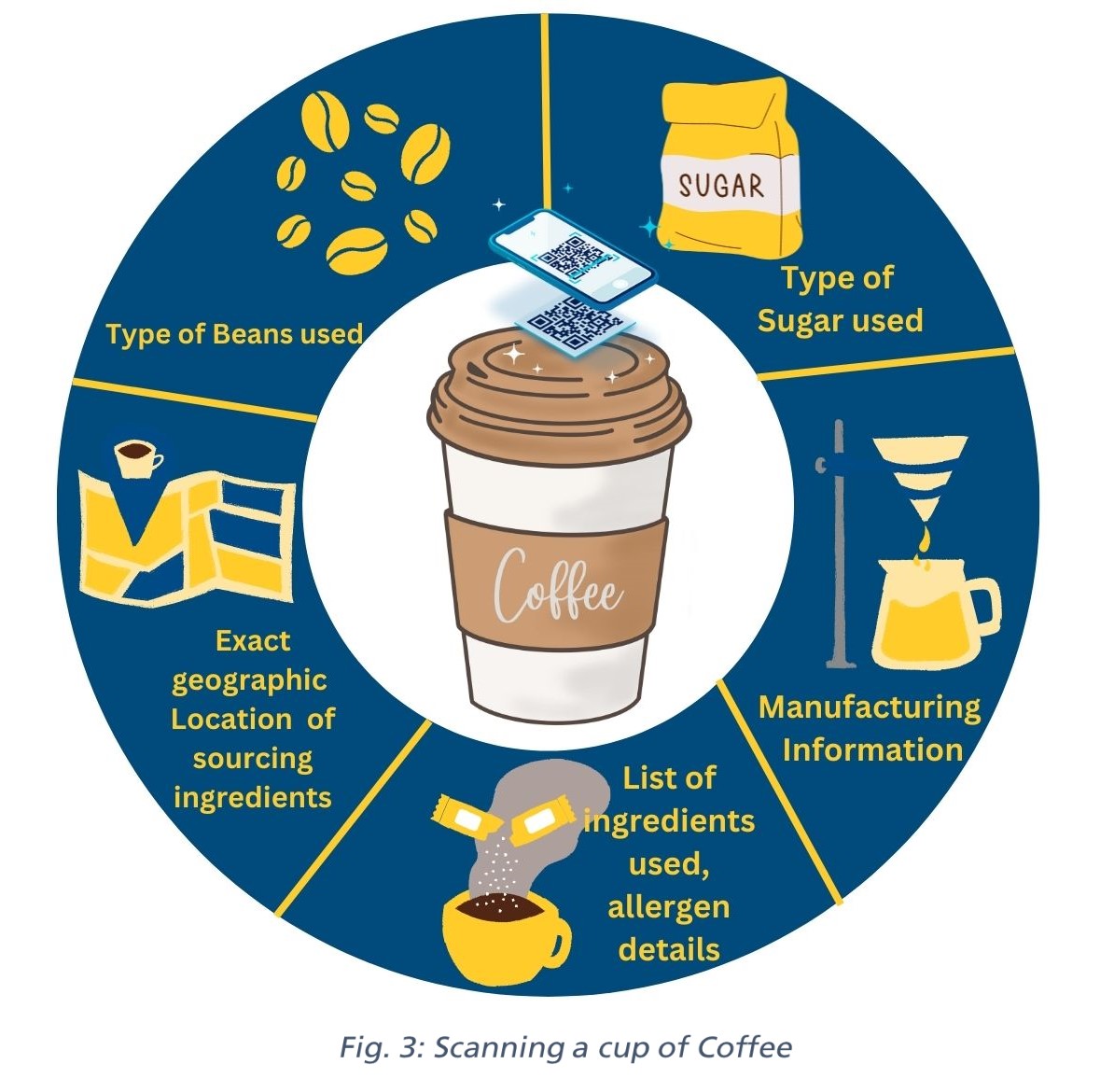Traceability in FMCG using Blockchain
Have you ever been curious about the ingredients of the packaged food you consume? Ever wondered how it is made, what it is made of, and whether it’s good quality? It may not have been considered earlier, but consumers have started taking a serious note of all these things. Earlier, they trusted the manufacturers easily, but the rising awareness about health and hygiene have led to a shift towards transparent and traceable options.
What does Blockchain have to offer in the FMCG space?
We’re familiar with terms like blockchain, cryptocurrency, Ethereum, distributed ledger technology as well as usage of Industry 4.0, emerging potentials of 5G for enhancing business performance in industries and so on. Well, these terminologies may sound overwhelming to a layman, but the potential it carries to disrupt any space is truly phenomenal.
To explain its application, let’s take an example of a person, who wants to buy fifty boxes of mangoes, each containing a dozen of them. These mangoes will be sourced from a faraway village, involving two additional charges, viz: transportation and taxes. One way is to trust the supplier, since there is no visibility of the sourcing and distribution processes; but what if these processes can be monitored and a fair deal can be ensured as per agreed terms? Well, that’s exactly what a blockchain does. It adds a layer of security without revealing any information, creating a highly safe, secure, and trusted environment.
Technically, smart contracts can be made using a blockchain, which will have conditions pre-written and locked. The buyer will load the payment in the system, which will be credited to the manufacturer’s account, once all the conditions are met. This will not only expedite the payment procedure, but also handle refund scenarios in case the conditions are not met, thus providing added security. The example above is a small-scale use case. A blockchain framework can handle huge and complex scenarios. Huge CPG giants having presence in multiple geographies, dealing with complex supply chains as well as multiple government protocols for every region, benefit hugely by implementing blockchain technology.
Serving fresh to consumers | The Farm to Fork (F2F) concept:
There are multiple touchpoints on the journey of packaged food products, starting from the farm to our plates. If all these processes involve sustainable practices, which get recorded on a blockchain framework, the information will help consumers take informed decisions according to their dietary habits.
Packaged food manufacturing companies need to ensure quality right from the sourcing stage to the time their products are consumed. Blockchain technology in the food industry can leverage the Farm to Fork concept. A distributed consensus-based system makes the participating stakeholders aware of all the processes by creating an indestructible record stored in a public ledger. Each stakeholder will record the details, viewable by scanning a QR code. If required, privacy can be further controlled using blockchain models in public, private, and hybrid modes.
Let’s understand this concept with the help of the infographic below:

The above infographic lists five crucial steps of the F2F concept. The outcome received from each step is forwarded to the next step only after punching the details in a blockchain network. The information can range from the practices used, raw material information, and likewise. This data can help manufacturers keep a close check on their products and processes and adhere to using sustainable practices. The consumers can equally benefit from these details while shopping from retail outlets.
F2F is a win-win:
Farm to Fork gives rise to healthier eating options and offers options for consuming food that is ethical and safe. It also gives a clearer picture of the materials that are sourced and hence, increases transparency. Farm to fork also helps us realize the importance of not just encouraging the use of environmentally friendly products, but also choosing those which are beneficial for our health2.
Strengthening the Supply Chain using Blockchain
Today, supply chain in agriculture and food sector suffers many challenges, including lack of transparency, data manipulation and other complex issues. There are many stakeholders involved in this process, like small farmers, mediators, warehouses, logistics, super-stockists, retailers, general trades, and modern trades. Blockchains implemented on a double chain structure along with IoT will certainly help in providing a more open, transparent, and secure path for transactions, building a more trusted environment among the partners involved10.
Increasing transparency at the shop:
With a quick scan of the QR code, displayed on the product, from any phone with QR code scanning capability, customers can view all the relevant information in detail.

For instance, imagine sitting in a coffee house which offers unique coffees made from coffee beans, sourced from multiple geographic locations. Wouldn’t you be excited to know the exact source of the beans and other ingredients, or even the cultivation methods that were used? Won’t you appreciate the fact that the producer has proper licenses and follows ethical practices11? What if all this information was available just by scanning a code? Sharing such information with customers makes them more aware and helps build loyalty towards the brand.

Major Drivers for adoption of Blockchain in FMCG:
Leveraging Blockchain in FMCG will be a wise decision only if it is done with some study, as there may be many roadblocks in its adoption as per complexity. I have tried to explore the drivers of Blockchain and presented it in the table below for brands looking forward to its adoption. If the brands wish to use blockchain and their requirements match completely or at least one from each block, then they should definitely go ahead. In case of a completely different set of requirements, which are not listed here, a combination of blockchain with other suitable mechanism/technology would be required.

Who is already in the race?
Global FMCG giants have already raised their bars by early adoption of Blockchain technologies to harness its great capabilities:
- A few years ago, Walmart ran a pilot project for backtracking their products. Without using blockchain, they took 6 days 18 hours and 26 minutes to track a pack of sliced mangoes to its source. Using blockchain capabilities, they were able to trace mangoes stored in their USA stores in just 2.2 seconds7.
- Nestlé has also forayed in leveraging blockchain for a select edition of their coffee brand Zoégas which will allow their consumers to validate the authenticity of the coffee beans, collected from three regions – Rwanda, Brazil, and Colombia8.
- The American food manufacturer, McCormick, has also used Smart labels, which will provide various products sourcing information to their consumers at their fingertips after scanning the labels9.
Experts’ opinion on Blockchain adoption in FMCG:
- A research paper titled “Blockchain technology in Food Industry: A review of Potentials, Challenges, and Future Research Directions”, provides a holistic view of the usage of Blockchain in FMCG. As per the paper, the usage of Blockchain in FMCG is in quite a nascent stage, but has a great potential to disrupt this industry and have a lasting impact on the Food Supply chain. It can drastically improve food traceability, maximize operational efficiency, and encourage sustainable food trading3.
- The Food Safety and Standard Authority of India (FSSAI) is also quite keen on exploring and leveraging blockchain capabilities in terms of traceability and surveillance from an Indian perspective. According to their article, in order to tackle the hygiene parameters and the negative effects caused by the pandemic, it has become even more essential to inspect and regularly monitor the quality of food4.
Potential Challenges in Blockchain Adoption
- There are a lot of stakeholders involved across the chain and its success depends on the successful contribution and participation of all the stakeholders.
- Due to the rise of privacy regulations like GDPR preserving data and complying with multi-nation regulations may become challenging until a common set of rules are not established for blockchain.
- Educating stakeholders and making them aware of this mechanism will still be challenging, not only in developing countries but also in some developed countries, until a strict framework or guidelines are not imposed by authorities for its adoption.
- The cost needed to set up can be quite high, depending on the stakeholders, and the question might arise that who should pay for all the implementation if there are huge stakeholders involved.
Closing comments:
As it is rightly said that “Trust is a two-way street”. Hence, respecting consumers’ expectations and providing them with a product which is made with utmost care, trust and safety are of paramount importance for any food manufacturer. It may seem that it’s too early to adopt blockchain, but it is worth the hype. A closer look at its potential and advantages in the FMCG industry will reveal the huge value add which it brings along. It has the potential to disrupt this field and an early mover advantage may certainly bring great success to businesses, if adopted with due diligence.
LTIMindtree’s offerings in this space:
LTIMindtree offers extensive consulting on the adoption of Blockchain capabilities and transforming businesses’ growth to the next level across multiple industries and use cases. Learn more here(Transform Business Operations with Decentralized Ledger Platforms for Blockchain | LTIMindtree)
References:
1) https://www.bcg.com/publications/2022/agribusiness-and-the-shift-to-sustainable-farming
2) https://www.grazia.co.in/lifestyle/food/farm-to-fork-is-your-new-path-to-eating-clean-7399-1.html
3) https://www.mdpi.com/2305-6290/4/4/27
4) https://www.fssai.gov.in/upload/media/FSSAI_News_Mulling_Outlook_28_07_2021.pdf
5) https://www.foodnavigator-asia.com/Article/2020/08/24/India-food-fraud-alarm-Much-more-needs-to-be-done-if-Make-in-India-campaign-is-to-succeed
6) https://www.futuremarketinsights.com/reports/blockchain-in-agriculture-market
7) https://one.walmart.com/content/globaltechindia/en_in/Tech-insights/blog/Blockchain-in-the-food-supply-chain.html
8) https://www.nestle.com/media/news/nestle-blockchain-zoegas-coffee-brand
9) https://www.bizjournals.com/baltimore/news/2018/03/28/mccormick-ceo-talks-growth-new-hq-and-blockchain.html
10) https://www.ncbi.nlm.nih.gov/pmc/articles/PMC7522652/#b0405
11) https://www.seechangemagazine.com/how-blockchain-technology-is-working-to-end-child-labour-in-the-cacao-industry/
Latest Blogs
A closer look at Kimi K2 Thinking, an open agentic model that pushes autonomy, security, and…
We live in an era where data drives every strategic shift, fuels every decision, and informs…
The Evolution of Third-Party Risk: When Trust Meets Technology Not long ago, third-party risk…
Today, media and entertainment are changing quickly. The combination of artificial intelligence,…




